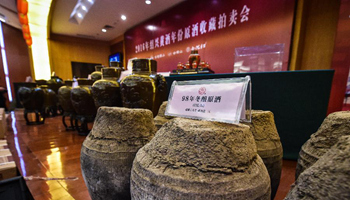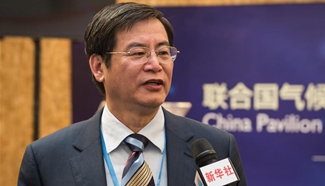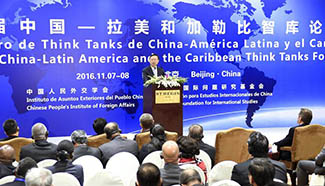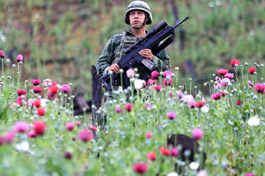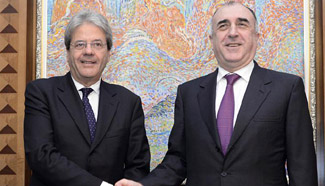BEIJING, Nov. 8 (Xinhua) -- "Mr. Changjiang: I feel very sorry for not treating you properly last time!" said a letter by Chinese leader Mao Zedong in 1937. "We all read your articles and want to express our deep thanks."
Mao was then leader of the Communist Party of China (CPC), and the recipient of the letter Fan Changjiang is a renowned Chinese journalist and former chief editor of Xinhua News Agency.
Born in October 1909, Fan, originally named Fan Xitian, used the byline "Changjiang" which refers to the Yangtze River, China's longest waterway.
Fan was the first reporter in China to truthfully report the Red Army's Long March, which Chinese President Xi Jinping has said was an "epic" and "human miracle."
From October 1934 to October 1936, the Chinese Red Army soldiers left their bases and marched through raging rivers, cold mountains and desolate grasslands to break the siege of Kuomintang (KMT) forces, and continue to fight Japanese aggressors in World War II. Some of them marched up to 12,500 kilometers.
In 1935, Fan, 26 years old at the time, took ten months to interview and present timely Long March reports to people across China.
His reports were published at least one year earlier than the accounts in the "Red Star over China" by American journalist Edgar Snow.
By reporting both the victories and defeats of both the CPC-led Red Army and the KMT forces, Fan's stories offered a precious, objective and impartial view of the Long March, breaking the monopoly of the KMT's biased reports.
Chinese people at that time were impressed by the detailed and in-depth observation in Fan's stories.
In one story, Fan used the example of an ordinary young Red Army soldier to give a first-hand narrative of the tough conditions facing the army as they marched through the grasslands:
"Out of Maoergai, we entered the grassland. The grassland was such an appalling place. ... The ground was soft earth, water and mud, unable to support a person's weight. Every single step would leave us mired in the mud. Even walking half a li [about 250 meters] makes people extremely exhausted. If you wore shoes or socks, they would be engulfed [in mud] after several steps.
"There were many rivers in the grassland, which we had to cross on foot. ... The water was freezing cold, and there were often soldiers stiffened by the cold, who fell into the water and die."
Fan's reports of the Long March were later compiled into a book "The Northwestern Corner of China" in 1936. The book was so popular that it was reprinted more than six times within a year.
Zhou Enlai, the senior CPC leader who became the first premier of the People's Republic of China, first met Fan in 1937 and said: "The Red Army are very familiar with your name. You have no relation to our Party or the Red Army, but we are much impressed by your study and analysis of our moves."
After the "Xi'an Incident" on Dec. 12, 1936, when KMT General Zhang Xueliang cooperated with General Yang Hucheng to take the KMT leader Chiang Kai-shek hostage, demanding Chiang stop the civil war and unite with the CPC in the war against Japanese aggression, Fan made a face-to-face interview with CPC leaders to find out what happened.
He was warmly welcomed by CPC leaders in Yan'an in February 1937.
Mao spent a whole night talking with Fan but still sent the letter to express regret for not showing enough hospitality.
Fan joined the CPC in 1939. He was later appointed the chief editor of Xinhua and then deputy head of China's press administration.
In an article in memory of Fan, Zhang Zhen, a late senior Chinese military leader, praised Fan for his patriotic spirit, down-to-earth work style and professional journalism.
China established the "Fan Changjiang Journalism Award" to honor outstanding Chinese journalists in 1990. The award later became the "Changjiang Taofen Award," after Fan and another renowned journalist Zou Taofen.
The "Changjiang Taofen Award" and the China Journalism Award are the two most prestigious journalism prizes in China.
China has designated Nov. 8, the date a group of journalists led by Fan established the young Chinese journalists' association in 1937, as the country's Journalist Day.
"In a certain sense Fan is still alive today, and his career is still moving on," wrote Israel Epstein, a Jewish journalist and writer, in an article in 1992, hailing Fan as a legendary forerunner and model for Chinese journalists.



